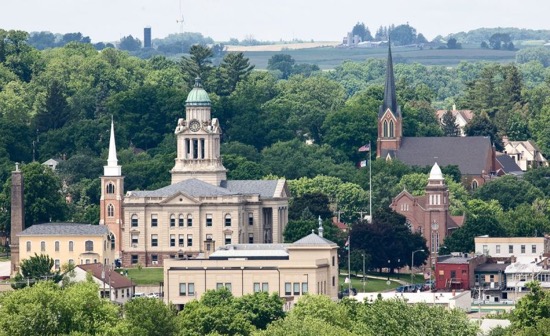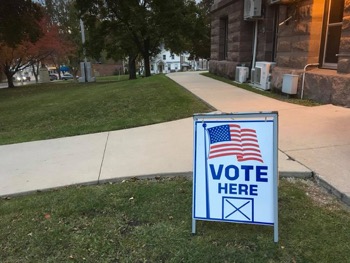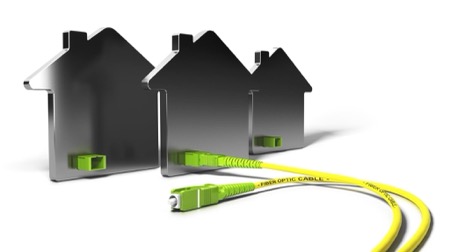
Decorah, Iowa has struck a public private partnership with West Union Trenching to deploy a modern fiber-to-the-home (FTTH) network that passes every household in the city.
The project is the culmination of decades of planning and frustration at the lack of affordable, next-generation broadband in the city of 7,500.
According to the city, the Decorah 2025 Fiber to the Home Project will finally begin construction early next year.
The city has also struck a deal with Minnesota-based AcenTek to operate the system and provide retail internet service to residents. Network equipment and construction is being financed by a $13.7 million loan approved last month by the city’s Municipal Telecommunications Utility Board of Trustees.
“The fiber plant and electronics will be city owned, our operations side of it is being handled by Acentek,” Chopper Albert, Decorah IT Director told ISLR.
The first subscribers are expected to come online sometime in early 2027. The project’s origins extend back more than a decade after locals struggled to gain access to affordable, fast, and reliable broadband access.
“This is a unique start-up arrangement for Iowa,” said Travis Goedken, City Manager of the City of Decorah. “After reviewing multiple business plan options since the successful election by Decorah residents in 2015 to establish a Board-governed municipal telecommunications utility, this was the most favorable option.
"City staff and the Municipal Telecommunications Utility Board have been working diligently the last two years to organize and execute the necessary steps to make this a reality.”

Since 2013 the city has owned an 11-mile core fiber network, dubbed the Decorah MetroNet, which was born out of frustration after a major flood in 2008 across much of Iowa resulted in prolonged communications network outages.
MetroNet (not to be confused with the Indiana-based ISP that goes by the same name) currently provides access to Luther College and 18 additional government buildings and anchor institutions.
By 2015, city officials began considering using an excess of city dark fiber to expand access to all local residents and businesses, particularly given widespread public anger at the high costs, spotty service, and slow speeds provided by the regional monopolies Mediacom and Lumen (formerly Centurylink).
Driven By Market Failure And A Lack Of Competition
For most of the city, Mediacom is the only broadband option at anything close to current generation speeds. Lumen provides service to somewhere around 13 percent of the city, but largely via outdated DSL lines that often fail to even meet the FCC’s dated definition of broadband (25 megabit per second (Mbps) downstream, 3 Mbps up).
Mediacom covers roughly 87 percent of the city, and has a long history of leveraging its political influence to try and derail community owned and operated broadband builds, often by actively misleading local voters. In 2021, the cable operator lobbied (unsuccessfully) for a new state law that would all but ban the funding and construction of such locally-owned networks.
Centurylink and Mediacom have some of the worst customer satisfaction ratings of any industry in America. And they’ve repeatedly justified their sluggish speeds by insisting that local municipalities don’t actually need next-generation speeds. And they’ve defended their duopoly by misleading locals into thinking municipal broadband is an inevitable boondoggle.

Despite well-funded opposition by regional telecom monopolies, Iowa has been a hotbed of municipal fiber deployments, many of which have inspired Decorah’s renewed interest in building its own fiber network.
Waterloo, Iowa, population 67,695, recently took steps to begin building its own $115 million fiber network in a bid to drive down consumer costs.
Other cities, like Waverly, have had success providing the public affordable fiber in conjunction with the city-owned utility (we profiled Waverly in Episode 493 of the Community Broadband Bits Podcast).
Decorah officials say they were also inspired by the steady progress made by Fort Dodge, where residents in 2019 approved the creation of a municipal broadband utility after decades of frustration with substandard broadband from their own regional duopoly: Mediacom and Frontier Communications.
Locally Owned, Locally Supported
Decorah leaders previously told ILSR that it was important to maintain ownership of the finished network, avoiding the pitfalls of some public-private partnerships (PPP) – where the city often has little say on the trajectory, rates, or management of the completed network.

This new network should be able to provide symmetrical gigabit fiber to every last resident across an estimated 3,000 homes and businesses. The new network will also allow for the upgrading of dated city SCADA and water meter systems, only a third of which can currently be monitored without a direct visit to the actual water meter.
"This is 141 miles of additional conduit fiber to be installed throughout the city limits," Goedken said during a public hearing. "This will reach every premise within the city limits of Decorah."
Decorah officials urge interested locals to “take the Decorah pledge” and register at the city’s website, ensuring they’re first in line for service with free installation when the service first goes live sometime next year.
"The goal was always to get fiber here and it has been a long, hard project," Mayor Lorraine Borowski recently said at a town hearing after applauding the board’s "patience, diligence, and perseverance."
"Once it gets there, it is gonna be very, very valuable for the citizens of Decorah,” she added.
Header image of Decorah stone wall courtesy of city's Facebook page
Inline images courtesy of City of Decorah Facebook page







